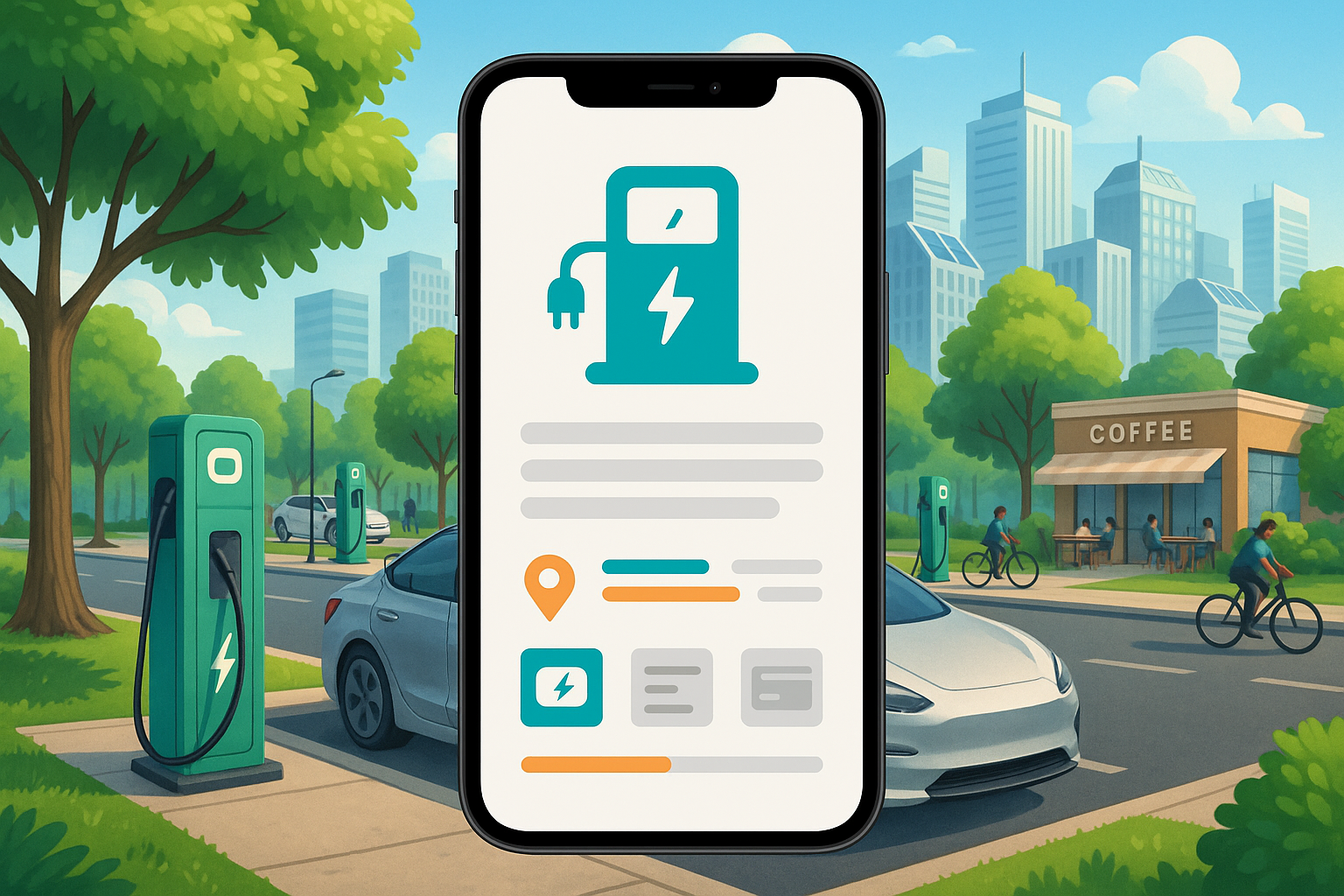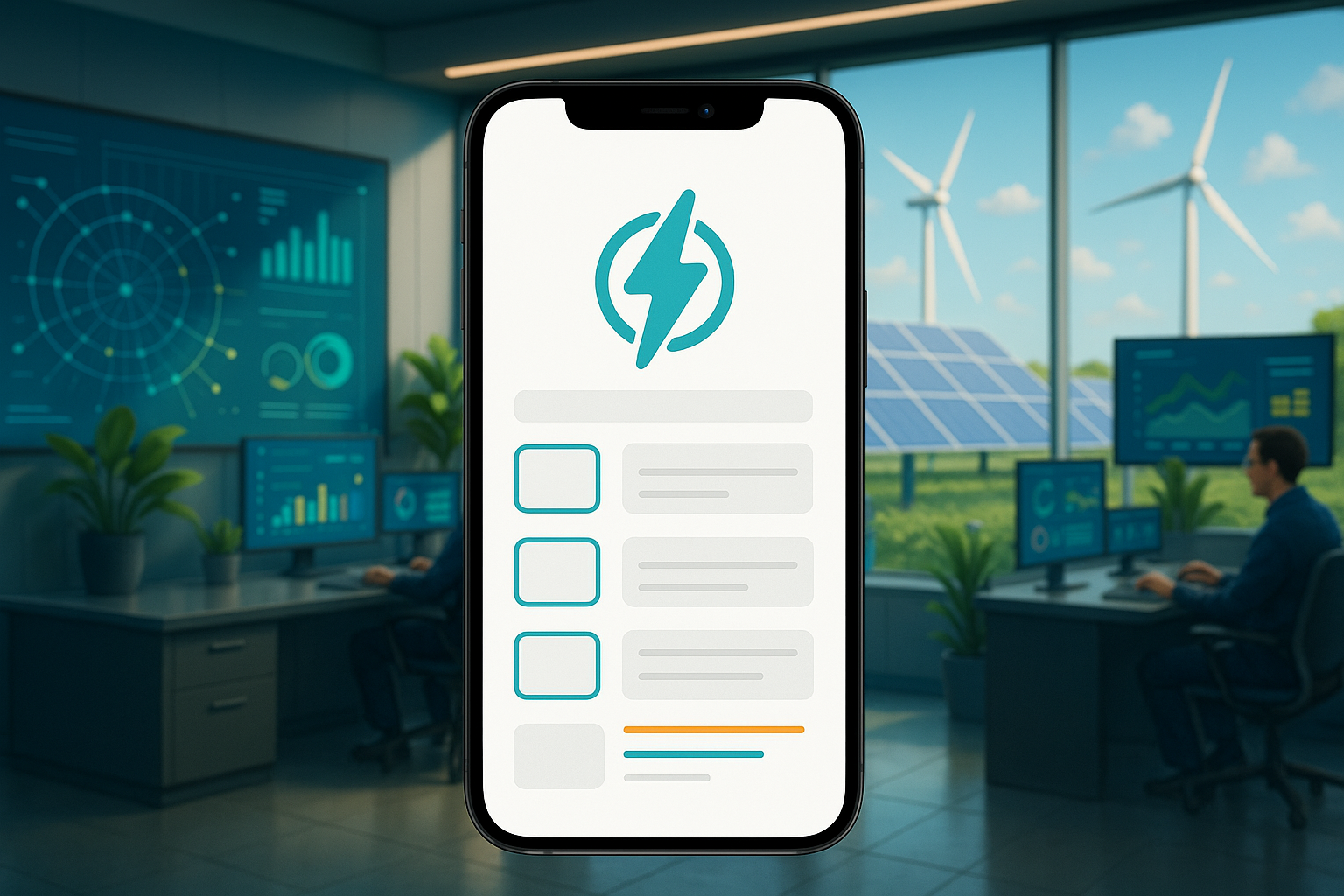The electric vehicle (EV) revolution is accelerating, and with it, the demand for a seamless, reliable charging infrastructure. At the heart of this infrastructure is the software that connects drivers to chargers: the EV charging app. For drivers, these apps are indispensable tools for alleviating range anxiety and making EV ownership practical. For businesses, they represent a critical entry point into a rapidly growing market. However, developing a robust and user-friendly EV charging app is far from simple. The path is littered with significant technical hurdles, from fragmented hardware standards and complex communication protocols to the intricate demands of creating a cohesive user experience.
This article serves as a comprehensive guide to the world of Electric Vehicle Charging app development. We will explore what these apps are, dissect the formidable challenges of building one in-house, and examine the different types of apps available to consumers. Furthermore, we will provide a clear-eyed look at development costs and introduce the leading companies that can turn your vision into a reality. Among them, we at MetaCTO, a premier US-based, AI-powered mobile app development firm, have the expertise to navigate this complex landscape. We specialize in transforming ambitious ideas into market-ready applications, and we are here to help you build an EV charging solution that not only works flawlessly but also delights your users.
What is an Electric Vehicle Charging App?
At its core, an Electric Vehicle Charging app is a mobile application designed to help EV drivers find charging stations, access them, and pay for the electricity they consume. It acts as the digital bridge between the driver, their vehicle, and the vast network of public and private charging points. A well-designed app removes the friction from the charging process, transforming what could be a stressful experience into a simple, predictable routine. To achieve this, these apps must provide users with accurate, real-time information and a suite of powerful features that cater to the entire charging journey.
The functionality of a modern EV charging app extends far beyond a simple map. A truly useful app is a comprehensive tool that provides drivers with everything they need to manage their vehicle’s energy needs. This includes a rich set of features built around discovery, usability, and convenience.
Core Features of a High-Quality EV Charging App
A successful EV charging app is defined by its features. The best apps provide a straightforward and intuitive navigation system, ensuring that crucial information about station locations, availability, and pricing is clear and easy to find.
-
Station Locator and Real-Time Availability: The most fundamental feature is a map or station locator. This allows drivers to see nearby charging stations at a glance. Critically, this map must be enhanced with real-time data. Drivers need to know not just where a station is, but whether it’s currently available or in use. An app that provides accurate, up-to-date status information—including whether a station is occupied, the expected charging time for the current session, or any potential maintenance issues—is invaluable.
-
Detailed Station Information: Simply knowing a station’s location isn’t enough. Users need detailed information to determine if a station meets their specific needs. A comprehensive app will provide data on the types of connectors available (e.g., Level 2, Level 3 DC fast charging), the charging speed in kilowatts, and pricing structures. This transparency helps drivers avoid arriving at a station only to find it’s incompatible with their vehicle or more expensive than anticipated. Many apps also list additional amenities, such as parking availability or nearby facilities like restrooms and coffee shops.
-
Seamless Payments and Authentication: To create a truly hassle-free experience, EV charging apps must integrate a secure and reliable payment system. This allows users to pay for their charging sessions directly through the app, eliminating the need for physical credit cards or multiple network-specific RFID cards. Some apps also handle authentication, providing a simple “start” and “stop” function within the app to initiate and end a charging session remotely.
-
Trip Planning and Route Management: For long-distance travel, range anxiety remains a significant concern. Advanced EV charging apps address this with trip planning features. These tools allow drivers to create a route based on the location of compatible charging stations, ensuring they can complete their journey without worry. The best route planners factor in the vehicle’s range and suggest optimal charging stops along the way.
-
Smart and Integrated Features: The most innovative apps leverage smart technology to enhance the user experience. This can include the ability to remotely monitor and control a charging session, receive notifications when charging is complete or has been interrupted, and even reserve a charging spot in advance. Some apps can integrate with a vehicle’s in-car system, allowing drivers to access charging information directly from their car’s display. Further integration with digital assistants and smart home platforms can also be a feature, allowing for voice-activated controls and scheduling.
-
Community and User Feedback: Community features like user reviews, ratings, and comments can be incredibly powerful. Drivers can share their experiences, leave tips about a specific station, report a faulty charge point, or share advice with fellow EV drivers. This crowd-sourced information adds a layer of trust and real-world insight that static data alone cannot provide. Apps like PlugShare and ChargePoint have built strong communities around this type of user-generated content.
Reasons It Is Difficult to Develop an Electric Vehicle Charging App In-House
While the end-user experience of an EV charging app should be simple and intuitive, the back-end development is anything but. Attempting to build a sophisticated EV charging application in-house presents a host of technical and logistical challenges that can easily derail a project, leading to delays, budget overruns, and a subpar final product. These difficulties stem from the complex interplay of hardware, software, communication protocols, and regulatory standards that define the EV charging ecosystem.
Integration Complexity
One of the most significant hurdles is integrating all the necessary components into a single, cohesive system. EV charging software development often involves multiple teams and third-party vendors—from hardware manufacturers and payment gateway providers to network operators (CPOs and EMSPs). When each team acts independently, often relying on shared documentation that may lack crucial details, the risk of failure is high. A software update from one team can unknowingly break functionality elsewhere. The functionality of the entire system can stop working at any stage of the development process, creating a frustrating and costly cycle of bug fixes and patches.
Hardware and Software Inconsistencies
The EV landscape is not standardized. Despite the existence of global protocol agreements, some car manufacturers include unique details in their vehicle specifications. This can cause significant integration challenges. An app that works perfectly with one vehicle model may fail with another from the same manufacturer, just from a different production year. This inconsistency is a developer’s nightmare. An EV that has charged successfully at a station ten times might inexplicably encounter a software problem on the eleventh attempt. Thoroughly testing for every possible combination of vehicle, charger, and software version is a monumental task.
The Burden of Testing
Setting up a comprehensive testing environment for EV charging software requires a tremendous amount of effort. Because physical testing with every vehicle and charger model is impractical, development teams must rely on emulators. However, creating and maintaining these emulators is a time-consuming process that can slow down the development timeline. Furthermore, whenever a charger controller’s logic is updated by the hardware vendor, the corresponding emulators must also be adjusted to ensure communication remains consistent and accurate. This constant need for maintenance adds another layer of complexity to the project.
Protocol and Regulatory Maze
The EV charging industry is governed by a web of communication protocols, certifications, and standards. Navigating this maze without deep expertise can lead to serious issues. For instance, some communication protocols, such as OCPP 1.6 (Open Charge Point Protocol), can be challenging to interpret. A protocol that works seamlessly with one hardware vendor’s implementation may not connect properly with another’s. A common and frustrating issue arises from the categorization of protocol fields as “required” or “optional.” In many cases, fields marked as optional are, in fact, essential for the system to function correctly, leading to integration failures that are difficult to diagnose. On top of this, regulatory compliance must be considered, and these regulations are updated periodically, requiring the development team to stay constantly informed of changes.
Performance, Scalability, and Complexity
As an EV charging system’s functionality grows, achieving and maintaining high software performance becomes a major challenge. More features mean more code, more integrations, and more potential points of failure. Slow performance and software crashes can frustrate users and damage the brand’s reputation. Simply optimizing code may not be enough to ensure high performance as the user base and network scale. In many cases, upgrading to more powerful hardware becomes necessary to mitigate future risks, adding to the overall cost. Finally, the software must meet the diverse needs of multiple user types—including drivers, charge point operators, and service technicians—all through a single interface. This inherent system complexity is a primary driver of the long project timelines associated with in-house EV charging software development.
Given these profound challenges, partnering with an experienced mobile app development agency like MetaCTO can be the difference between success and failure. We have the expertise to manage these complexities, ensuring your app is built on a solid foundation that is reliable, scalable, and compliant from day one.
Different Types of Electric Vehicle Charging Apps
The EV charging app market is not monolithic. It is composed of several distinct types of applications, each serving a slightly different purpose. For an EV driver, having a few of these apps on their phone can be incredibly helpful, especially when traveling more than a hundred miles from home. Understanding these categories is key to understanding the competitive landscape and identifying opportunities.
Manufacturer-Specific Apps
Most electric cars come with an available app specific to that vehicle or the manufacturer’s lineup of EVs. These apps often integrate deeply with the vehicle’s systems, allowing owners to monitor charging status, precondition the cabin temperature, and sometimes even manage payments for charging on the manufacturer’s preferred network. While highly convenient for owners of that specific brand, their utility is limited to a single ecosystem.
Network-Specific Apps
These apps are operated by the companies that own and manage large charging networks. They are essential for accessing and paying for charges on their proprietary stations.
-
ChargePoint: The ChargePoint app provides access to one of the largest networks, with hundreds of thousands of charging ports worldwide. A key feature is its roaming agreements, which allow a user to use their ChargePoint account to charge at stations from other major networks like FLO and EVgo. The app also allows users to see tips from other drivers about specific stations and can be used to manage ChargePoint’s line of home chargers.
-
Electrify America: This network’s app is heavily focused on providing Level 3 DC fast charging. It sends notifications when a previously occupied charger opens up and allows users to track their charging status remotely. Users can get notified when their car reaches a desired state of charge. The app also offers a Pass+ subscription plan that provides reduced charging rates for a monthly fee.
-
EVgo: The EVgo app stands out with its reservation feature, which allows users to reserve a charger ahead of time. Users can filter for stations by connector and charger type, monitor their session in real-time, and earn rewards for their charging activity.
-
Volta: Volta operates on a unique business model, often providing free Level 2 charging for a set period at retail locations like malls and grocery stores. The Volta app allows users to check the availability of these chargers, see how long they can charge for free, and get directions to the station.
Aggregator Apps
Aggregator apps are third-party applications that consolidate information from multiple charging networks into a single interface. They are incredibly useful for drivers who want a comprehensive view of all available charging options, regardless of the network provider.
- PlugShare: PlugShare is arguably the most popular aggregator app. It features hundreds of thousands of stations from a cross-section of major networks, including ChargePoint, Electrify America, EVgo, Volta, and even Tesla’s Supercharger network (for non-Tesla vehicles where applicable). Its power lies in its comprehensive filters, which allow users to search by plug type, network, and charging speed. PlugShare provides real-time availability, a robust trip planner, and a highly active user community that shares live updates, photos, and charging tips. While it facilitates payment at some participating locations, its primary function is discovery and planning, making it an indispensable resource for almost every EV driver.
The best charging apps, whether network-specific or aggregators, excel at providing the core information drivers need: nearby stations, charging speeds, current rates, and real-time availability. They also help users plan longer routes by factoring in necessary charging stops, ensuring a smooth and stress-free driving experience.
Cost Estimate for Developing an Electric Vehicle Charging App
The cost of developing an EV charging management software solution can vary widely, contingent on the complexity of the features, the size and location of the development team, and the scope of the project. Based on industry data, the investment can range from tens of thousands to several hundred thousand dollars.
Cost Breakdown by Complexity
The functionality you choose to include will be the single largest determinant of the final cost. We can group projects into three general tiers of complexity:
| Complexity Level | Description | Estimated Cost Range |
|---|---|---|
| Simple | A basic app with core features like a station map, user registration, and a simple payment system. It may lack real-time data or advanced integrations. | $40,000 – $60,000 |
| Moderately Complex | An app with real-time station availability, advanced search filters, multiple payment options, and features like trip planning and user reviews. | $60,000 – $100,000 |
| Highly Complex | A sophisticated, white-labeled platform with smart features like remote session control, reservation systems, integration with in-car systems and smart home devices, advanced analytics for operators, and roaming agreements with multiple networks. | $100,000 – $250,000 |
Cost Variation by Geographic Location
The hourly rate for development talent is another major factor. Rates differ significantly around the world, which can have a substantial impact on the total project budget.
| Region | Average Hourly Rate |
|---|---|
| United States | $95 – $100 |
| Western Europe | $80 – $90 |
| Australia | $70 – $90 |
| UAE | $60 – $65 |
| Eastern Europe | $50 – $55 |
| Asia | $25 – $40 |
While lower hourly rates in regions like Asia or Eastern Europe may seem attractive, it’s crucial to balance cost with expertise, communication, and time zone alignment. Working with a US-based firm like MetaCTO ensures you partner with experts who are at the forefront of technology and can provide the strategic guidance necessary for a complex project like an EV charging app.
Top Electric Vehicle Charging App Development Companies
Choosing the right development partner is critical to the success of your EV charging app project. A good partner brings not only technical skills but also industry knowledge and strategic insight. Here are some of the top companies providing EV charging software solutions.
1. MetaCTO
As a top-tier, US-based AI-powered mobile app development agency, we at MetaCTO are uniquely positioned to build complex, high-performance applications. We handle every step of the process, from initial strategy and product discovery to design, iterative development, launch, and ongoing growth. Our expertise in custom mobile app development is backed by 20 years of experience and over 120 successful projects.
Integrating EV charging functionality into a mobile app is difficult because it requires a deep understanding of the technical challenges discussed earlier—navigating labyrinthine communication protocols, ensuring compatibility across a fragmented hardware landscape, and building a scalable architecture that can handle real-time data from thousands of endpoints. Hiring a development agency like MetaCTO mitigates these risks. We have the seasoned technical leadership to architect robust solutions and the agile development process to adapt to the evolving demands of the EV industry. Our 90-day MVP service is designed to get your product to market quickly, allowing you to validate your idea, gather user feedback, and attract investors without a massive upfront investment.
2. Tridens
Tridens offers Tridens EV Charge, an all-in-one, cloud-based EV charging software solution. Their offering is recognized as providing great value for money and comes with a white-labeled, easy-to-use mobile application. The platform is designed to help Charge Point Operators (CPOs) and e-Mobility Service Providers (EMSPs) efficiently manage their infrastructure by monitoring charging sessions, tracking usage, and optimizing rates. Tridens has a global presence, with availability from North and South America to Europe, Africa, Asia, and Australia.
3. ChargePoint
As a leader in the EV charging space, ChargePoint provides its own robust software platform, which comes with the well-known ChargePoint app. This software gives drivers access to their massive network of hundreds of thousands of charging ports worldwide, including those of their roaming partners.
4. Shell Recharge Solutions
A major player in the energy sector, Shell offers its Shell Recharge Solutions software, which is bundled with a mobile app for both Android and Apple phones. This solution leverages Shell’s extensive resources and growing presence in the e-mobility market.
5. EV Connect
EV Connect provides software that comes with an app designed to simplify operations for CPOs and EMSPs. Their focus is on providing a powerful management platform for businesses that own and operate charging stations.
6. ChargeLab
ChargeLab develops robust software that includes a mobile app with polished end-user interfaces. Their solution makes it easy for EV drivers to find, pay for, and use charging stations, focusing heavily on a smooth and intuitive driver experience.
7. Ampeco
Ampeco provides a comprehensive EV charging platform that is bundled with white-label EV driver apps. This allows businesses to launch their own branded charging service powered by Ampeco’s technology, offering a high degree of customization for CPOs and EMSPs.
Conclusion
The journey to developing a successful Electric Vehicle Charging app is both promising and challenging. As we’ve explored, these apps are no longer simple utilities but complex ecosystems that are central to the EV driver experience. They must provide a rich set of features—from real-time station discovery and seamless payments to intelligent trip planning and community feedback—all while operating on a flawlessly reliable and scalable technical foundation.
We’ve seen that the path of in-house development is fraught with obstacles, including severe integration complexities, hardware and software inconsistencies, and a labyrinth of industry protocols and regulations. These challenges underscore the immense value of partnering with an experienced development firm. By examining the different types of apps on the market, the potential costs involved, and the top companies in the space, it becomes clear that success in this domain requires deep expertise, strategic planning, and flawless execution.
Building a world-class EV charging application demands more than just code; it requires a partner who understands the intricacies of the industry and has a proven track record of delivering complex mobile solutions. At MetaCTO, we live and breathe this work. We thrive on transforming complex challenges into elegant, user-centric products.
If you are ready to build a powerful EV charging solution or integrate these advanced features into your existing product, the next step is to talk with an expert. Talk with an Electric Vehicle Charging expert at MetaCTO today to integrate Electric Vehicle Charging into your product.






